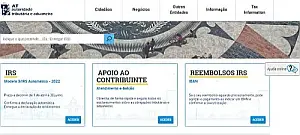

Is it so very different?
Ofcourse: living in another country means that you have to get your finances in order: getting a fiscal number, opening a bank-account, maybe a mortgage and last but not least: paying taxes. As in almost everything, these things are pretty straightforward in Portugal.
Not an advertisement, but looks like it
A fiscal number: how to obtain a NIF
(Numéro de Identificação Fiscal / numéro de contribuinte): ↑
Without a NIF you can't do anything official like buying a house, a car, opening a bankaccount etc. Obtaining a NIF is free if you do it yourself. You can also have it done by a specialized company, there are several websites for this to be found, but they charge you for it.
Doing it yourself:
- from your homecountry you will have to make an appointment at the Portuguese embassy or consulate, mostly on their website you can look up what documents you need (which isn´t a lot).
- In Portugal itself: go to an office of the Portuguese tax-authority (AT: Autoridade Tributária e Aduaneira), almost every bit of a town has one. Mostly you only need an ID-card / passport and a proof of your adress of your homecountry: take two or three letters from authorities with you, preferrably one that contains your passport- or ID-card number or a fiscal number that's also on your ID-card or passport.
Once you have your NIF you can create an account on their website, which will give you all insights about your fiscal situation like the property or the Portuguese car you own, what (if) you have to pay and when etc.: Portal das finanças.
Opening a bankaccount: ↑
This is a bit of a tricky one: mainly because banks all have their own policies. Main rule for Europeans is that you need a NIF and an ID-card or passport. You will have to ask the bank itself about what else you need.
Most banks also require you to deposit an amount like 200 / 250 euros which you then can withdraw within a day.
On average a bankaccount costs you like 5 euros a month, transferring money to another (SEPA)-country mostly costs you about 1 - 2 euros.
For non-Europeans banks may ask additional documents but because there's no general rule here, you will have to do these inquieries at the bank itself, contact us, or ask around on social media.
Getting a mortgage: ↑
We won't get too deep in this because there are many things that count and every situation has it's specific needs. Basically there are three types of mortgages, they differ in the percentage of interest that you pay (+/- 1,5%) and the amount of money that you have to put in yourself (mostly 30%).
- Then the property must be legally habitational
- your age will be taken into account and
- they will charge you costs (mostly between 1,70 and 2,50 %).
Taxes: ↑
Our experiences with the Portuguese tax-authorities are pretty good: they are very helpful and reachable. Once you've created an account on their portal there's an interactive helpsystem which answers most questions, next to that there's e-Balcão to whom you can send a message and ask questions. Mostly your question will be answered within 3 days.
The tax-system is progressive, there's a threshold of around 9.000 euros income on which you pay no income-tax, then the percentages will rise per amount of income that you have.
Tax on cars and houses are not too high.
They have a good messaging-system where you can choose to receive e-mails and text-messages when there's something that you need to do.
The language is mostly the biggest obstacle for foreigners, if you are not sure ask a tax-advisor to help you, some have their office in the streets and most banks have tax-advisors too.